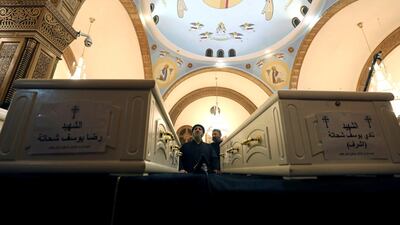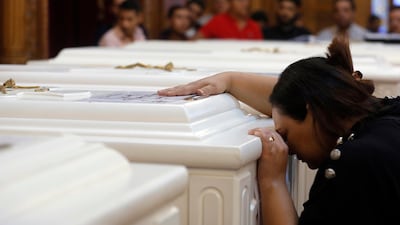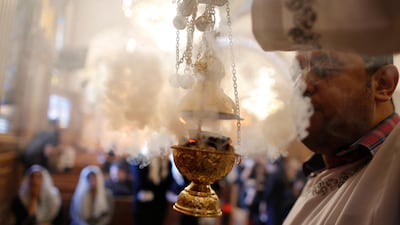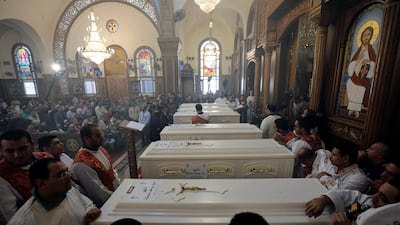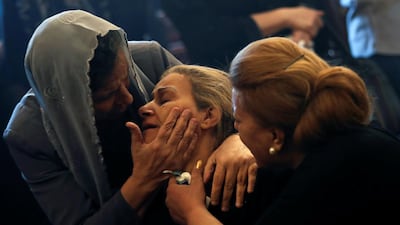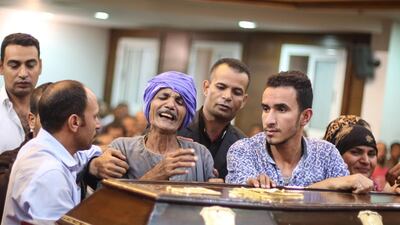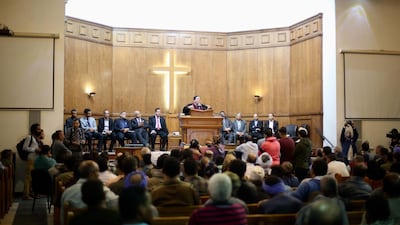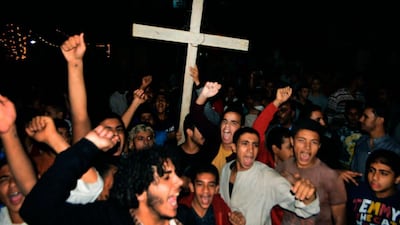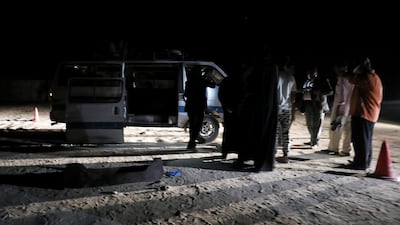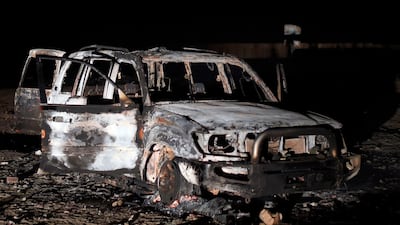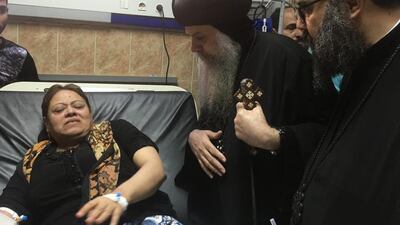ISIS claimed responsibility for the deaths of seven people in an attack which targeted a convoy of buses carrying Coptic Christians on the way back from a visit to a monastery.
Bishop Makarios of Minya told The National that unknown assailants opened fire on the buses on Friday afternoon. On board were worshippers from Sohag and Minya returning from the monastery of St Samuel the Confessor.
All three buses travelling from the monastery were hit, but only one was forced to stop, Bishop Makarios said.
An eyewitness said that two 4x4 cars had chased the buses, and managed to stop the third one. “They shot at the first two but the drivers were not hit, so the two buses managed to escape.”
Bishop Makarios quoted some of the injured passengers saying that four attackers participated in the raid, and most of them wore white galabeyas, traditional Egyptian robes.
The attack took place almost at the exact location where 28 Christians were killed by Islamist militants in May 2017. After the attack, visits to monasteries were banned by the Coptic Orthodox Church, as most of them are in remote desert areas.
However, the decision was soon withdrawn, as most of the monasteries depend on income from worshippers and tourists.
The seven deaths included two women and five men, said a spokesperson of the Coptic Church Father Bouls Halem. He added that the six of the victims were from one family. “We consider them martyrs, and the may the Lord have peace on them.”
At least 13 of the passengers were injured and were transferred to nearby hospitals, the governor of Minya General Kassem Hassan said.
Riot police and several armoured personnel carriers were deployed around the crime scene and around the hospital in the hours following the incident. Meanwhile family and friends of the dead and wounded gathered outside.
Crying and screaming overwhelmed the entrance of Maghahga Hospital where most of the injured victims were taken before they were later transported to hospitals in Giza. While workers were still mopping up blood from the emergency entrance, Makary, a carpenter from Minya rushed into the reception to check on his relative, Mariam Nassem, who was injured during the attack.
Mr Makary, 47, burst into tears as he heard that his relative had sustained minor injuries. “One of the bishops called me to tell me that the bus she was riding was attacked by terrorists,” he said.
“Every Friday the church organises trips for the families and children. They go to the monastery to pray, make friends and have fun. Who said you should be killed because you go to pray?”
The seven bodies were transferred to the Minya Public Hospital.
Near the emergency door to the hospital's morgue, loud crying of women overwhelmed the scene while elder men stood to receive mourners who came to pay respect.
One of the mourners is Mohamed Shabana, a government employee at the Ministry of Transportation. “We are here to stand by our Coptic brothers. Whoever did this is a coward and is not man enough to come and fight men. They are only able to kill women and children.”
“You see the crowd. Everyone is sad and crying. There is no difference between Muslims and Christians.”
While elderly citizens kept their calm, young people expressed their anger about the of lack of security around monasteries. Abanoub Nassef, a student at the University of Minya said: “It is the same old scenario. The attack happens. The police intensify its presence and then weeks later they disappear, leaving the same roads unprotected.
“Where are the special forces and elite troops that we see on TV?” the young man asked before he went back to arguing with the riot police guarding the hospital in order to allow an elderly woman in after she fainted from crying.
Minya has a considerable Coptic population, and is also home to several sectarian acts where ultraconservative radical Muslims physically oppose the building of churches or the occurrence of Coptic prayers in residential areas.
Since the overthrow of president Mohamed Morsi in 2013, the Egyptian state has been trying to quell radical Islamist thought, but controlling preaching and establishing outlets to counter militant ideologies, in addition to distance radical preacher from popular platforms.
Egypt has also been physically and legally confronting militancy all over the country, particularly in Sinai and the Delta.
Even though militant presence is not very common in Upper Egypt, when attacks take place, they are often deadly.
Since August, security forces announced they had killed 14 militants, on two different occasions, in Assuit, South of Minya, claiming that they were planning attacks on security personnel. Also last month, the Egyptian military sentenced 17 alleged militants to death over bombings of churches that were claimed by ISIS, leaving dozens dead.
In May 2017, ISIS published an interview with an unidentified leader of the group's Egypt affiliate warning Muslims of going places that "crusader nationals of western countries" gather, including churches.
The leader said in an interview published by the group's Al Nabaa newsletter: "We warn you to stay away from gatherings and places of interests to Christians, army and police, political and economic government facilities as well as gatherings of nationals of the Western crusaders."
Riot police and special forces troops now maintain a heavy presence in upper Egypt, especially in Luxor where Copts celebrate the St George feast at Rozikat Mountain.
A security source said Friday’s attack will not affect ongoing plans to secure the festival. He added that fingers are pointed at a suspected terrorist cell who is known for its affiliation with ISIS.
“The forces are currently suspecting that the Amro Saad Abbas Cell might be responsible for the attack.”
Abbas is known as the leader for cells which previously orchestrated attacks on churches, leaving 74 people killed in 2016 and 2017 targeting Coptic Christians in Cairo, Alexandria and the Nile Delta city of Tanta. Security forces have previously handed out wanted posters of Abbas encouraging civilians to give any information that would lead to his arrest.
“Although he was not previously registered as a political agitator in Upper Egypt, he raised in the radical scene after the 25 January uprising, and joined militant groups which lead several suicide bombings,” the source added.
_______________
Read more:
Libya captures fugitive Egyptian militant Hisham Ashmawi
Fighting likely to delay Libya's December elections says UN envoy
Refugees detained in Libya are drinking toilet water to survive
_______________
Abbas is considered number two on Egypt’s most wanted list, after Egyptian Al Qaeda commander Hisham who was captured early October in extremist stronghold of Derna.
Egyptian President Abdel Fattah El Sisi mourned the victims. "I deeply grieve for the martyrs who fell today by treacherous hands that seek to undermine the cohesive fabric of the homeland,” Mr El Sisi said on Facebook.
Internationally and locally, the attack was condemned. The country's parliament, ministries, and political parties asserted that the attack will not "hinder Egypt's fight against terrorism."
The country's highest Muslim institution Al Azhar sent its condolences to the families of the victims. The UAE, UK, Germany, Saudi Arabia, and Jordan condemned the terrorist attack.
